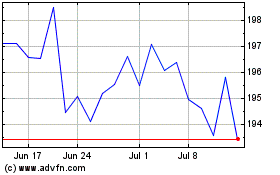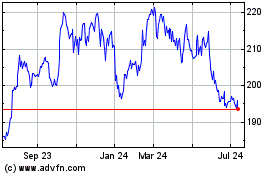Coking Coal Swaps Market To See Rapid Growth -Credit Suisse Executive
August 29 2011 - 6:22AM
Dow Jones News
The market for coking coal swaps will grow rapidly in the near
term as steel market participants seek to hedge their exposure to
volatile raw materials costs, a senior executive at Credit Suisse
said Monday.
Kristian Thunes, the bank's global head of freight and iron ore
in Singapore, told Dow Jones Newswires that recent turbulence in
commodity markets will boost volumes.
He was speaking after the launch of CME Group's (CME) OTC
cleared contract for coking coal swaps.
"More and more people do like clearing their raw material
costs," he said.
Earlier in the day, Credit Suisse completed the first swap on
CME's new Nymex-listed Australian Coking Coal (Platts) Low Vol Swap
Futures (ALW) contract.
Credit Suisse and an unnamed coal market participant completed a
60,000-metric-ton transaction that allows the bank's counterparty
to swap exposure to floating coking coal prices for exposure to a
fixed price.
"We have been working in the iron ore market for four years, so
the next obvious question for our clients was how we were going to
work on their exposures to met coal," Thunes said, describing the
development of coking coal swaps as a "very natural next step."
The coking coal swaps market will see the same strong growth as
iron ore swaps have since they were launched, Thunes said. Credit
Suisse has been involved with iron ore swaps since 2008.
"We aim to continue to lead in the coking coal swaps market, but
the market will need other participants to grow. Indeed, the more
participants, the merrier," he said.
"Everyone trading iron ore probably has some form of met coal
exposure, so we think the growth in iron ore swaps is probably a
good indicator of how big this market can become."
On Aug. 23, CME cleared a record 120 lots of Iron Ore 62% Fe
(TSI) swap options, representing 60,000 tons, a spokesman for the
exchange operator said Monday.
Thunes said some steel mills are cautious about using raw
material derivatives, but other end-users, including car
manufacturers, already have sophisticated index-linked raw
materials pricing systems in place.
As a proportion of total costs, coking coal represents around
20% for hot-rolled coils, while iron ore represents around 30%,
Thunes said.
-By Clementine Wallop; Dow Jones Newswires; 65 46154 082;
clementine.wallop@dowjones.com
CME (NASDAQ:CME)
Historical Stock Chart
From Jun 2024 to Jul 2024

CME (NASDAQ:CME)
Historical Stock Chart
From Jul 2023 to Jul 2024
